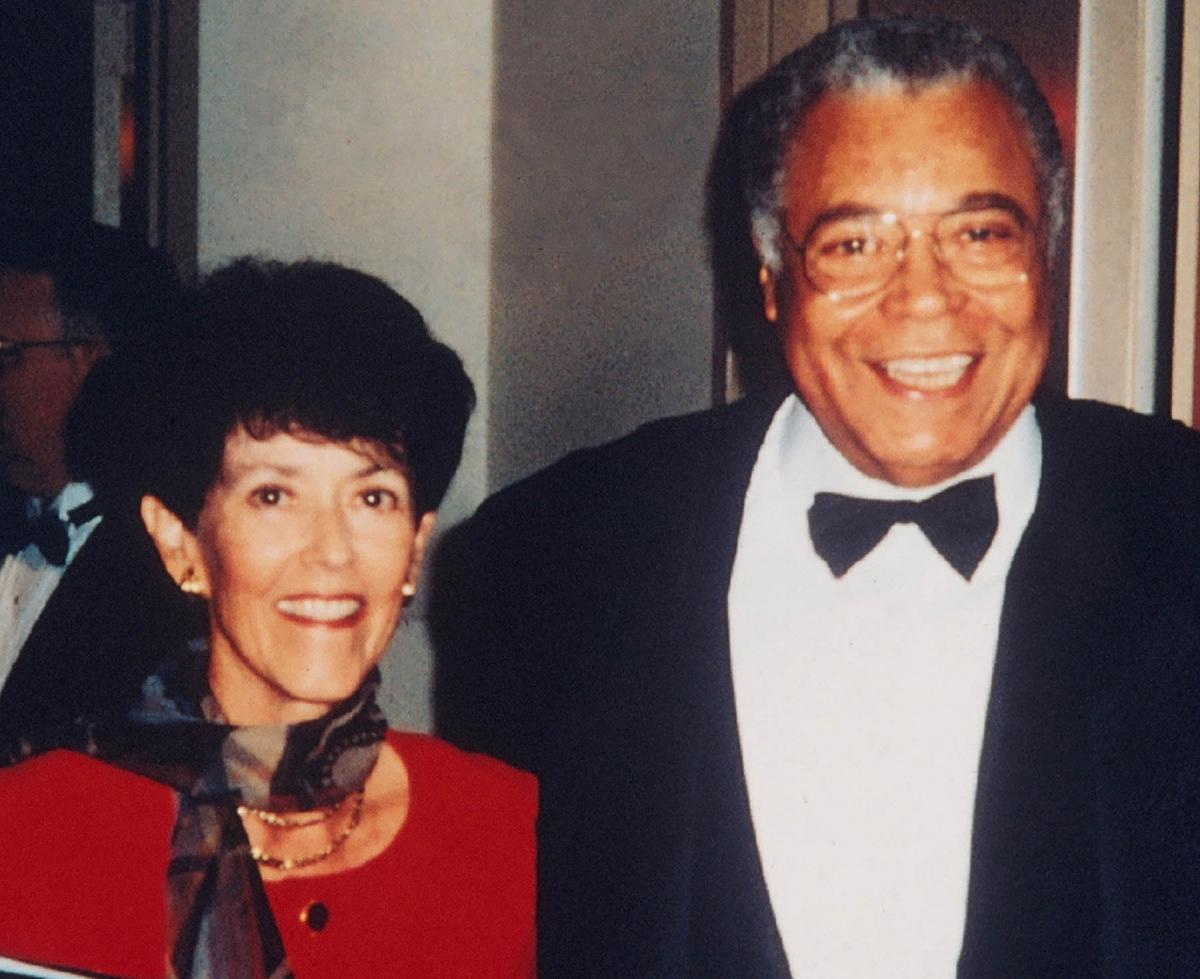 When James Earl Jones died on September 9, 2024, at the age of 93 from complications from type 2 diabetes, both the stuttering community and the world at large lost a giant. A front-page article in The New York Times, “James Earl Jones, Whose Powerful Acting Resonated Onstage and Onscreen, Dies at 93”, began, “James Earl Jones, a stuttering farm child who became a voice of rolling thunder as one of America’s most versatile actors in a stage, film and television career that plumbed race relations, Shakespeare’s rhapsodic tragedies and the face menace of Darth Vader, died on Monday at his home in Dutchess County, N.Y.” The Stuttering Foundation lost a great friend and longtime advocate for its work on behalf of people who stutter.
When James Earl Jones died on September 9, 2024, at the age of 93 from complications from type 2 diabetes, both the stuttering community and the world at large lost a giant. A front-page article in The New York Times, “James Earl Jones, Whose Powerful Acting Resonated Onstage and Onscreen, Dies at 93”, began, “James Earl Jones, a stuttering farm child who became a voice of rolling thunder as one of America’s most versatile actors in a stage, film and television career that plumbed race relations, Shakespeare’s rhapsodic tragedies and the face menace of Darth Vader, died on Monday at his home in Dutchess County, N.Y.” The Stuttering Foundation lost a great friend and longtime advocate for its work on behalf of people who stutter.
A comprehensive biography of Jones’ life and his extensive body of work is not possible in this article as it will focus on his lifelong struggles with stuttering and how he lent of himself to help his fellow people who stutter. He was born in Arkabutla, Mississippi, on January 17, 1931, and at the age of five he went to live with his grandparents, who raised him on a farm in Dublin, Michigan. Once a pre-med major at the University of Michigan, he graduated with a degree in drama, later serving as an officer in the U.S. Army during the Korean War prior to pursuing acting full-time.
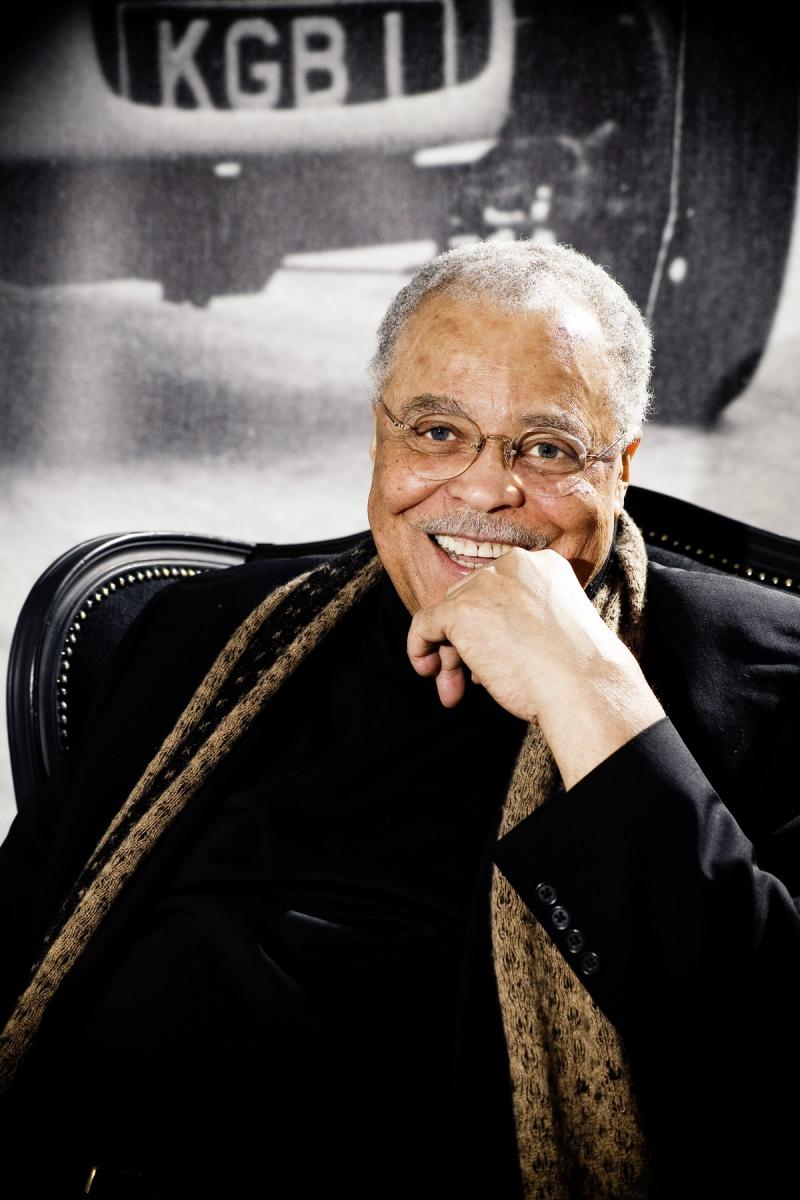 After working many years on Broadway, he won the Tony Award for Best Actor in a Play in 1968 for his role as a boxer in The Great White Hope, a role that he reprised in the 1970 film version which garnered him an Oscar nomination. In 1987 he won his second Tony Award for Best Actor in a play for his performance in Fences. The actor was presented with an Honorary Academy Award in 2011, making him one of the few actors to achieve the EGOT (Emmy, Grammy, Oscar, and Tony).
After working many years on Broadway, he won the Tony Award for Best Actor in a Play in 1968 for his role as a boxer in The Great White Hope, a role that he reprised in the 1970 film version which garnered him an Oscar nomination. In 1987 he won his second Tony Award for Best Actor in a play for his performance in Fences. The actor was presented with an Honorary Academy Award in 2011, making him one of the few actors to achieve the EGOT (Emmy, Grammy, Oscar, and Tony).
Of course, Jones’ star shot to international fame for his voice role as Darth Vader in the original Star Wars in 1977, and in the subsequent sequels The Empire Strikes Back (1983) and Return of the Jedi (1983). Some of his more notable movie roles have been in The Man, Claudine, Conan the Barbarian, Field of Dreams, The Hunt for Red October, and The Sandlot.
The story of James Earl Jones exemplifies that of a person who stutters who discovers that creative expression guides him to break free of his stuttering bonds. In 1974 he was quoted in The New York Times as saying, “Just discovering the joy of communicating set it up for me, I think. In a very personal way, once I found out I could communicate again, it became a very important thing for me, like making up for lost time, making up for the years I didn’t speak.”
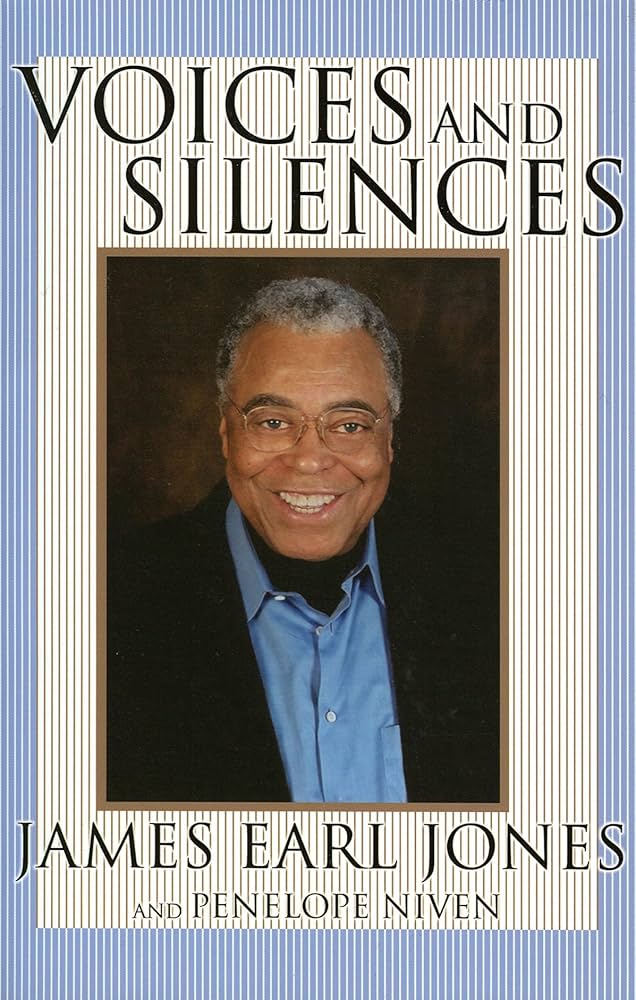 James Earl Jones teamed up with co-author Penelope Niven to publish a 1993 memoir, Voices and Silences, in which he vigorously addressed his stuttering at length.
James Earl Jones teamed up with co-author Penelope Niven to publish a 1993 memoir, Voices and Silences, in which he vigorously addressed his stuttering at length.
In the foreword, Penelope Niven wrote of Jones, “Because he is a stutterer, he shapes written language uniquely and works with even more care than most writers do. His hands linger over every sentence. His eyes and ears are attuned to the resonance of words. And his years of silence have forged a sensitive listener and observer.”
The actor stated that for a period of eight years from the time he was six until the time he was fourteen, he was virtually mute. His family and friends often accused him about lying about his inability to speak, saying things like, “We know you can talk. We have heard you talk.” He talked to his family in basic terms. He spoke to the farm animals at length and had conversations with himself.
In an interview with the Daily Mail, he stated, “I did communicate with the animals quite freely, but then that’s calling the hogs, cows, the chickens. They don’t care how you sound, they just want to hear your voice.”
He then stated that other children were not as accepting as animals. “Stuttering is painful. In Sunday school, I’d try to read my lessons and the children behind me were falling on the floor with laughter …. By the time I got to school, my stuttering was so bad that I gave up trying to speak properly.”
He put forth in Voices and Silences, “A stutterer ends up with a greater need to express himself, or perhaps a greater awareness of how you would like to say something. The desire to speak builds and builds until it becomes part of your energy, your life force. But when I was a boy, speech became a wall I could not surmount.”
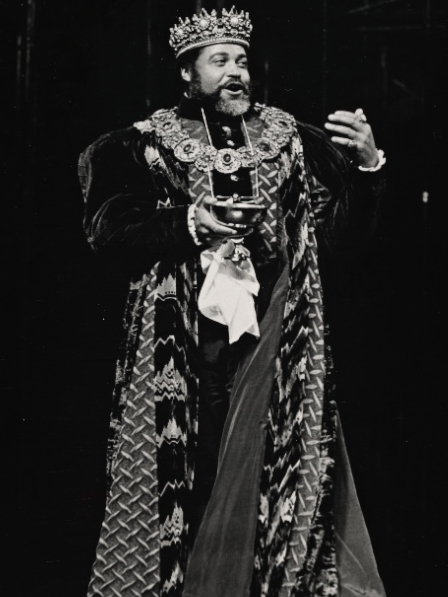 Early on in the book, Jones wrote that he was still non-speaking when he entered high school but that the pivotal teacher for him was Donald E. Crouch, a former college professor who came out of retirement to teach his class English, Latin and history. He wrote, “The turning point in my ability to cope with my stuttering came in Professor Crouch’s English classroom.” James Earl Jones may have never made a bigger understatement in his life.
Early on in the book, Jones wrote that he was still non-speaking when he entered high school but that the pivotal teacher for him was Donald E. Crouch, a former college professor who came out of retirement to teach his class English, Latin and history. He wrote, “The turning point in my ability to cope with my stuttering came in Professor Crouch’s English classroom.” James Earl Jones may have never made a bigger understatement in his life.
Professor Crouch took an interest in Jones and noticed that he wrote great poetry. He encouraged Jones to not just write the poetry, but to get up and recite the poems in front of the class. Jones wanted no part of that due to his speech, but Crouch insisted. Jones wrote, “I was shaking as I stood up, cursing myself. I strained to get the words out, pushing from the bottom of my soul. I opened my mouth – and to my astonishment, the words flowed out smoothly, every one of them. There was no stutter. All of us were amazed, not so much by the poem as by the performance.”
He continued, “Professor Crouch and I had stumbled on a principle which speech therapists and psychologists understand. The written word is safe for the stutterer. The script is a sanctuary. I could read from the paper the words I had composed there and speak as fluently as anybody in the class.”
“Aha!”, proclaimed Professor Crouch as he went to sit down. “We will now use this as a way to recapture your ability to speak.”
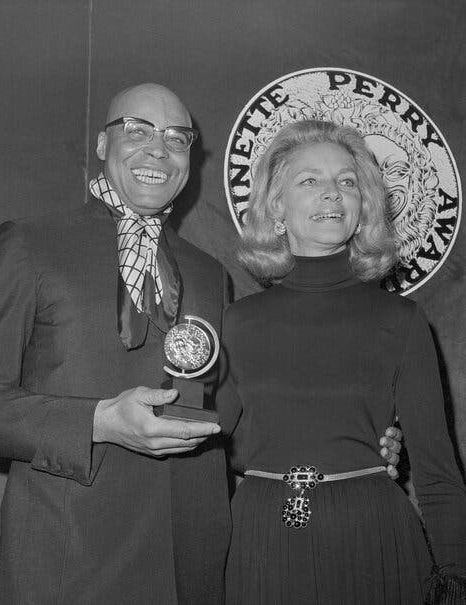 That recitation of his poem in front of his high school class was something that James Earl Jones always ranked as the biggest event of his life. It inspired him to recite Shakespeare to himself for hours on end, and to harness this fluent speech to take Professor Crouch’s advice to join the debate team, where he became a champion debater not only of his high school, but in high school competitions in Michigan. Naturally, this led him into acting. He wrote in his memoir of this high school metamorphosis, “I could not get enough of speaking, debating, orating – acting. I became the school’s champion public speaker. During those mute years, of course, my voice had changed, almost without my awareness, so in addition to the novelty of being able to speak, I could now speak in a deep, strong voice. People seemed to like to hear it, and I was overwhelmed to be able to speak aloud, in any voice at all.” It is safe to say that the rest is history.
That recitation of his poem in front of his high school class was something that James Earl Jones always ranked as the biggest event of his life. It inspired him to recite Shakespeare to himself for hours on end, and to harness this fluent speech to take Professor Crouch’s advice to join the debate team, where he became a champion debater not only of his high school, but in high school competitions in Michigan. Naturally, this led him into acting. He wrote in his memoir of this high school metamorphosis, “I could not get enough of speaking, debating, orating – acting. I became the school’s champion public speaker. During those mute years, of course, my voice had changed, almost without my awareness, so in addition to the novelty of being able to speak, I could now speak in a deep, strong voice. People seemed to like to hear it, and I was overwhelmed to be able to speak aloud, in any voice at all.” It is safe to say that the rest is history.
However, Jones always maintained that he was by no means cured and had to always work to manage his speech. In an interview with NPR, he said, “I don’t say was ‘cured.’ I just work with it.”
Several weeks before Jones’ death, a children’s book on the actor’s stuttering was published on July 30, 2024. Ode to a Grapefruit: How James Earl Jones Found his Voice was written by children’s author and speech-language pathologist Kari Lavelle and award-winning illustrator Bryan Collier. The book tells the story of how the young James Earl Jones did not speak for eight years except to animals and close family members, and how in high school the famed Professor Crouch made him stand up and read a poem he had written titled “Ode to a Grapefruit.” The book describes in fascinating detail how Jones amazingly found fluency in the recitation of that poem and thus embarked on his high school track of the debate team and acting, the path that would ultimately lead him to his brilliant career as an actor.
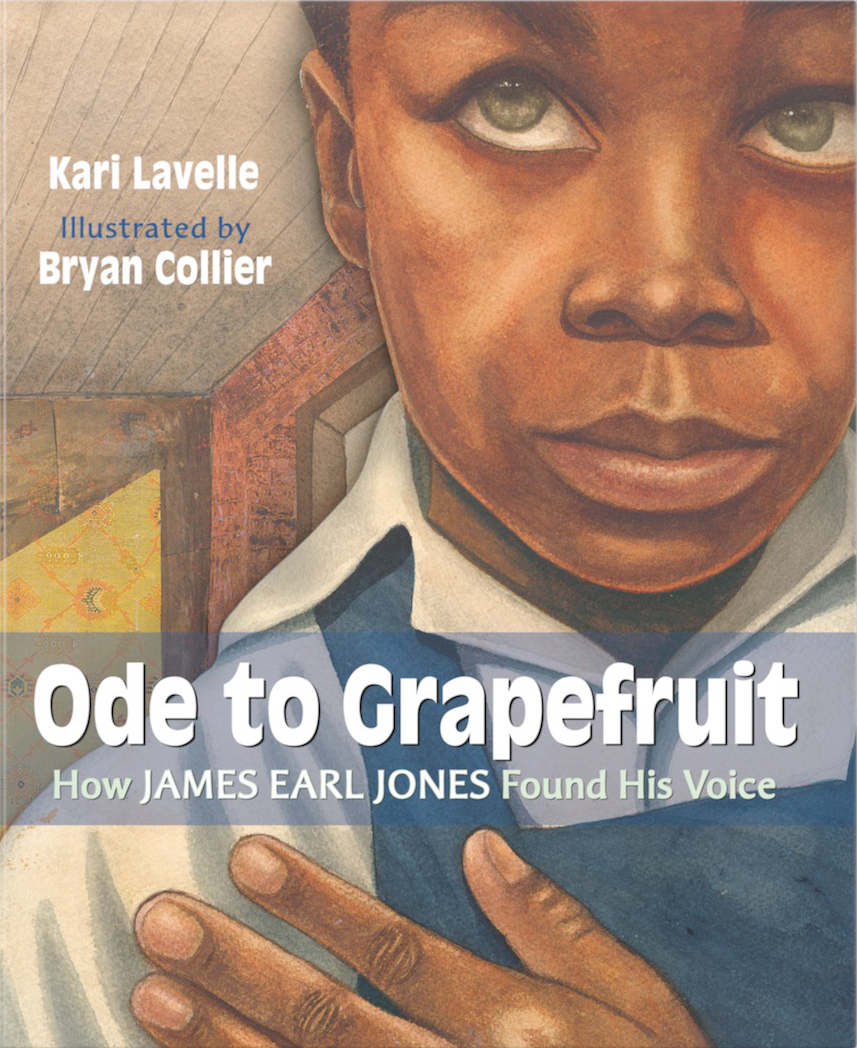 In an interview for the book, Kari Lavelle said, “As a speech pathologist, I frequently shared the story of James Earl Jones with my young clients for many years before I put pen to paper (or rather fingers to the keyboard). It can really be powerful to share the stories of celebrities who stuttered with these kids – a way to show that their stutter won’t hold them back from their dreams. The more I learned about James Earl Jones, the more that I knew his story had to be shared with young readers.”
In an interview for the book, Kari Lavelle said, “As a speech pathologist, I frequently shared the story of James Earl Jones with my young clients for many years before I put pen to paper (or rather fingers to the keyboard). It can really be powerful to share the stories of celebrities who stuttered with these kids – a way to show that their stutter won’t hold them back from their dreams. The more I learned about James Earl Jones, the more that I knew his story had to be shared with young readers.”
In a 1993 PBS interview, Jones addressed the famous instance in his high school class in which he recited the poem fluently, “Like song poetry is rhythmic and most stutterers don’t stutter when they sing. It’s [the stuttering] always there… it’s there right now…stutterers seem like they are ponderous and deep thinkers, we’re not. We’re looking for the word we can say without tripping on it.”
On October 17, 2023, Manistee County in Michigan commemorated the mentorship of their native sons Professor Donald Crouch and James Earl Jones by unveiling bronze statues of the two outside of Kaleva Norman Dickson Schools in Brethren, which is right across from the former Brethren High School. Jones was not able to attend himself, but one of his first cousins, Terry Connolly, spoke on his behalf and related how Jones was a mentor to him. Sid Halley, a great-grandson of Professor Crouch, spoke and said, “Mentoring is a small way for each of us to make a big difference for someone else. If my great-grandfather hadn’t taken the time to work with Mr. Jones… think of things that would be different for us. The plains of Africa would have a different voice, baseball in a homemade field in Iowa would sound different and Luke may not know who his father is.”
The event was more than just celebrating a local celebrity as it was an event to celebrate mentorship. The public was asked to nominate local mentors, of which more than 100 names are listed on a plaque next to the statues.
Upon the death of James Earl Jones, the Stuttering Foundation released a glowing portrait of his accomplished life on social media with the statement, “He was a faithful friend, for many decades, to the Stuttering Foundation, and a true advocate for the stuttering community.”
From the Winter 2025 Magazine






 Podcast
Podcast Sign Up
Sign Up Virtual Learning
Virtual Learning Online CEUs
Online CEUs Streaming Video Library
Streaming Video Library